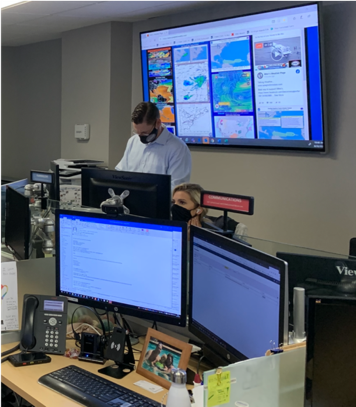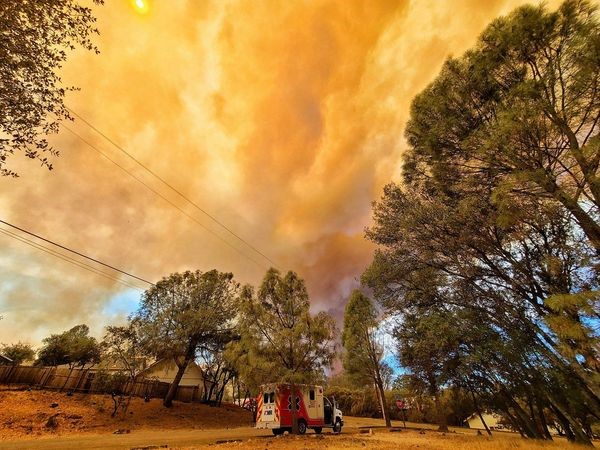GMR Activates More than 1,100 Personnel and 325 Ground and Air Assets in Response to Hurricane Laura
8.28.2020
As part of American Medical Response's (AMR) FEMA contract, GMR is deploying air and ground crews and medical transportation assets including more than 1,100 first responders, 300 ambulances, 15 helicopters, 10 airplanes and 131 paratransit units to help Louisiana communities devastated by the hurricane. Crews from GMR companies AMR, Air Evac Lifeteam, AirMed International, EagleMed and Med-Trans Corp., have been deployed. Latest deployment is in addition to GMR’s FEMA COVID-19 response in South Texas. Company is also providing medical support to firefighters and conducting evacuations because of wildfires in California.
(DALLAS) — Responding to a FEMA request for additional help in the communities devastated by a powerful Hurricane Laura, Global Medical Response (GMR) has sent more than 1,100 first responders, 300 ambulances, 15 helicopters, 10 airplanes and 131 paratransit units to Texas and Louisiana. The company sent crews and ground medical transportation assets earlier this week to South Texas to help with hurricane-related emergency medical services, under the auspices of FEMA. These two deployments are in response to the federal government's request to American Medical Response (AMR), GMR’s primary ground ambulance company, for EMS deployment for Hurricane Laura. During the deployments, GMR will dispatch crews to evacuate patients and run EMS calls in Louisiana and Texas communities.
"Hurricane Laura’s catastrophic 150 mph winds, heavy rains and storm surge have cut communities off from the medical care they desperately need,” said Ted Van Horne, Chief Operating Officer of Global Medical Response. “GMR teams and partnering EMS agencies from around the country are responding to this request for aid—we are proud of the dedicated First Responders who answer the call to provide care at a moment’s notice.” He added that COVID-19 safety precautions have compounded the complexity of the disaster response and GMR’s focus is ensuring the safety of patients and ground and air crews, making sure they have the equipment, support and resources they need to help our communities.
Van Horne added that during this unprecedented year, the company’s First Responders have battled multiple fronts, including natural disasters, tragic events and the pandemic. GMR teams were deployed by FEMA to South Texas last month to help with the COVID-19 outbreak in the region; that activation is currently scheduled through late September. The company has also responded to the California wildfires with emergency evacuations and medical treatment of firefighters.
“Responding to these catastrophic events does not take away from what our crews do day-in and day-out across the nation in the communities we serve,” Van Horne said. “For months, GMR First Responders, just like our colleagues in EMS around the country, have heroically responded daily to emergency calls related to the COVID-19 pandemic in communities across the United States.” He emphasized, “GMR has the expertise and ability to care for those suffering during a crisis and a pandemic, and we continue to provide compassionate care to those we serve in communities throughout the country.”
GMR deployed Air Evac Lifeteam and Med-Trans air crews and helicopters; the company also activated air crews and airplanes from Air Med International and Eagle Med. GMR also deployed ground crews from AMR and EMS providers around the country.
GMR’s National Command Center (NATCOM) in Dallas, Texas, was activated on January 28 when the pandemic started hitting the United States. When on active deployments, First Responder crews and medical transportation assets are supported by GMR’s Office of Emergency Management at NATCOM as well as onsite incident management teams in the Texas and Louisiana forward operating branches.
As the nation's largest provider of ground medical transportation and FEMA's prime emergency medical service response provider, AMR has a national agreement with FEMA to provide ground ambulance, air ambulance, paratransit services and non-ambulance EMS personnel to supplement the Federal and Military response to a disaster, an act of terrorism or any other public health emergency.
Van Horne said the crews are on various activations, which can change as the situation evolves. The crews will stay in the areas where they are deployed as long as needed. When the teams arrive at their assigned area, they will work under the guidance of FEMA, state and local EMS agencies.
"Hurricane Laura’s catastrophic 150 mph winds, heavy rains and storm surge have cut communities off from the medical care they desperately need,” said Ted Van Horne, Chief Operating Officer of Global Medical Response. “GMR teams and partnering EMS agencies from around the country are responding to this request for aid—we are proud of the dedicated First Responders who answer the call to provide care at a moment’s notice.” He added that COVID-19 safety precautions have compounded the complexity of the disaster response and GMR’s focus is ensuring the safety of patients and ground and air crews, making sure they have the equipment, support and resources they need to help our communities.
Van Horne added that during this unprecedented year, the company’s First Responders have battled multiple fronts, including natural disasters, tragic events and the pandemic. GMR teams were deployed by FEMA to South Texas last month to help with the COVID-19 outbreak in the region; that activation is currently scheduled through late September. The company has also responded to the California wildfires with emergency evacuations and medical treatment of firefighters.
“Responding to these catastrophic events does not take away from what our crews do day-in and day-out across the nation in the communities we serve,” Van Horne said. “For months, GMR First Responders, just like our colleagues in EMS around the country, have heroically responded daily to emergency calls related to the COVID-19 pandemic in communities across the United States.” He emphasized, “GMR has the expertise and ability to care for those suffering during a crisis and a pandemic, and we continue to provide compassionate care to those we serve in communities throughout the country.”
GMR deployed Air Evac Lifeteam and Med-Trans air crews and helicopters; the company also activated air crews and airplanes from Air Med International and Eagle Med. GMR also deployed ground crews from AMR and EMS providers around the country.
GMR’s National Command Center (NATCOM) in Dallas, Texas, was activated on January 28 when the pandemic started hitting the United States. When on active deployments, First Responder crews and medical transportation assets are supported by GMR’s Office of Emergency Management at NATCOM as well as onsite incident management teams in the Texas and Louisiana forward operating branches.
As the nation's largest provider of ground medical transportation and FEMA's prime emergency medical service response provider, AMR has a national agreement with FEMA to provide ground ambulance, air ambulance, paratransit services and non-ambulance EMS personnel to supplement the Federal and Military response to a disaster, an act of terrorism or any other public health emergency.
Van Horne said the crews are on various activations, which can change as the situation evolves. The crews will stay in the areas where they are deployed as long as needed. When the teams arrive at their assigned area, they will work under the guidance of FEMA, state and local EMS agencies.
.jpg)

